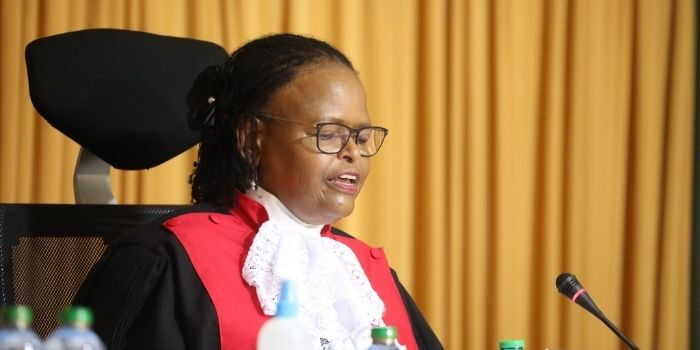The Ethics and Anti-Corruption Commission (EACC) has launched investigations on corruption allegations in the judiciary weeks after under pressure Chief Justice Martha Koome requested the probe.
According to EACC Chairperson David Oginde, the investigations were launched a week ago after the commission met with Koome during the swearing-in of Abdi Mohamud as the new chief executive officer of EACC.
Oginde was speaking on Wednesday while presiding over the launch of the National Integrity Academic Strategic Plan at the Kenya School of Government and said CJ Koome requested the commission’s hand to unearth the allegations of bribery within the Judiciary.
“We had a meeting with the Chief Justice. In that meeting, she raised the concern that she is receiving reports that some of her officers are taking bribes and therefore subverting justice. And so she, on her own initiative, called upon us to help her in this area,” Oginde stated.
EACC Chairperson David Oginde gives a speech during the Ethics and Anti-Corruption Commission (EACC) report on corruption in the healthcare sector in Nairobi on May 17, 2023.
Kenyans.co.ke
The EACC is combing three stations that have not been made public yet for suspected corrupt judiciary officials.
“Our teams are already in these three stations, but we are looking more closely at the judiciary as a whole. So should we find anything, we take the necessary steps that need to be taken to bring these people to justice so that we combat corruption in the judiciary,” he said.
The investigations into the judiciary come after a section of lawyers accused the country’s third arm of unabated corruption with different ranks.
Late last year, senior counsels and former presidents of the Law Society of Kenya (LSK) sounded the alarm about what they allege is “rampant corruption” plaguing the country’s judiciary.
The group, led by Gibson Kamau Kuria, Paul Muite, Nelson Havi, and Ahmednasir Abdullahi, announced a campaign set to begin on January 1, 2025, aimed at identifying and removing corrupt judges and advocates.
“We are presently at a very critical juncture in our country. As Senior Counsels who have all practised law for two to five decades each, it is very clear to us that the Judiciary has never been this corrupt,’ noted SC Abdullahi during a press briefing in December.
In response to the mounting pressure, CJ Koome wrote to the EACC and other investigative agencies to conduct investigations into reports that some of her officers are taking bribes, thereby subverting justice.
CJ Koome, in a notice, said that she has also engaged the National Intelligence Service (NIS), the Directorate of Criminal Investigations (DCI), and the Inspector General of Police.
The front view of the Judiciary building in Nairobi, Kenya.
Photo
Judiciary of Kenya


